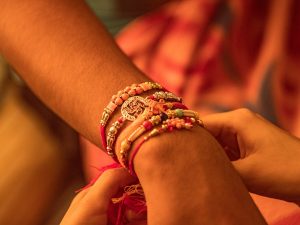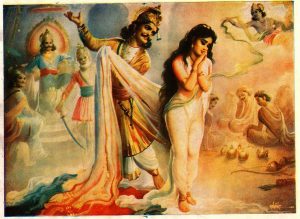Raksha Bandhan – August 15, 2019
Raksha Bandhan, also known as Rakhi (pronounced R-AH-K-REE) is a Hindu festival. This festival celebrates brother-sister relationships and sibling love. The term Raksha Bandhan originates from Sanskrit, and translates to “bond of protection.” Raksha Bandhan is observed on the full moon in the holy Hindu luni-solar month of Shravana. This month corresponds to the Gregorian calendar month of August.
During Raksha Bandhan, sisters (and female cousins) tie a rakhi on their brother and male cousins. A rakhi is similar to a friendship bracelet, but it’s more ornate. The rakhi signifies her bond and support of her brother and cousins. In exchange, the sisters and/or cousins receive a gift from their brothers. The gift often is a check or cash. The boys are charged with the responsibility of protecting the girls from life’s problems, and offering his blessings. This protection lasts for one year. After the gift has been exchanged, the girls place a sweet in the brother’s mouth.
There are many stories that people claim to be the origins of Raksha Bandhan; here are two of the more popular ones:
Draupadi & Krishna:
Draupadi and Krishna are siblings in the epic, the Mahabharata. This is one of Krishna’s many lives. As the story goes, Krishna cut his finger while handling sugarcane. Krishna’s wife, Queen Rukmini, sent someone to get bandages. However, Draupadi saw the incident, and she cut off part of her saree and tied it around his finger to stop the bleeding. Krishna then promised to help her out when she needed it. Several years later, some men try to undress Draupadi in public, by unraveling her saree. Krishna is there and sees this. Krishna uses his magic to make Draupadi’s saree never ending, so that she would not have to be disrobed in front of everyone.
Roxana & King Porus:
Alexander the Great invaded India in 326 BCE. His wife Roxana was worried about his safety. She sent King Porus, the king of the Pauravas, a rakhi, and asked him not to hurt her husband on the battlefield. During the Battle of the Hydaspes River, King Porus saw the rakhi on his wrist. This reminded him of his promise to Roxana. He then stopped himself from attacking Alexander. Porus lost the battle, but he won Alexander’s respect and honor. Alexander reinstated Porus as a governor of his own kingdom. He also allowed him to rule over last to the south-east of his kingdom.
Learn more about Hindu festivals and Draupadi with these titles:




Add a comment to: The Origins and Practices of Raksha Bandhan